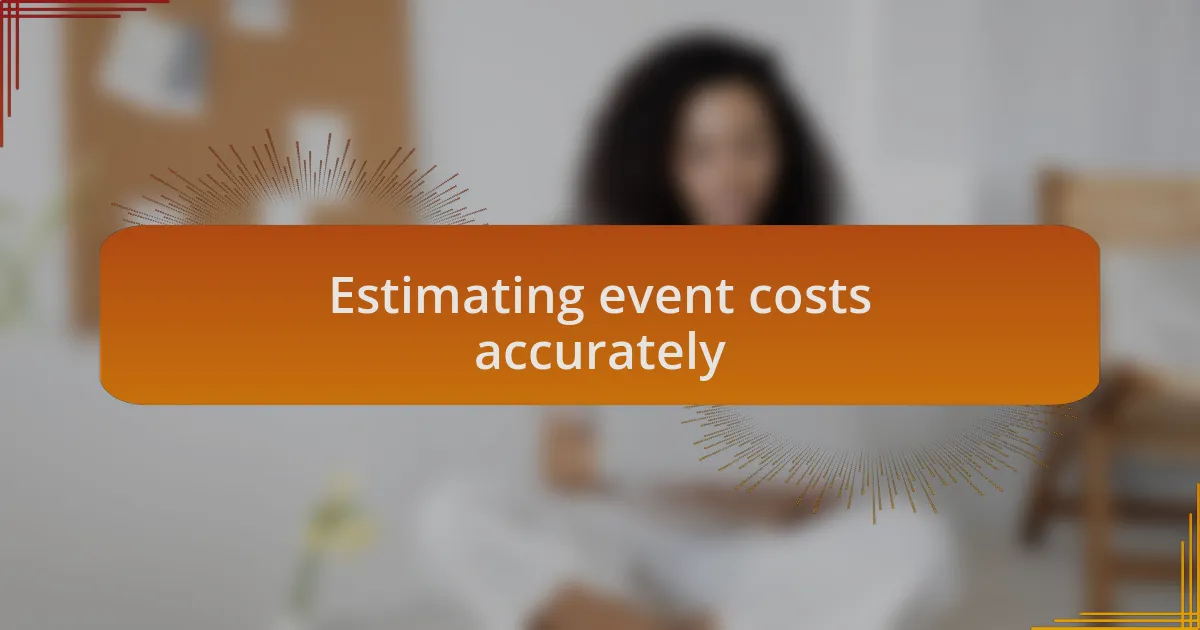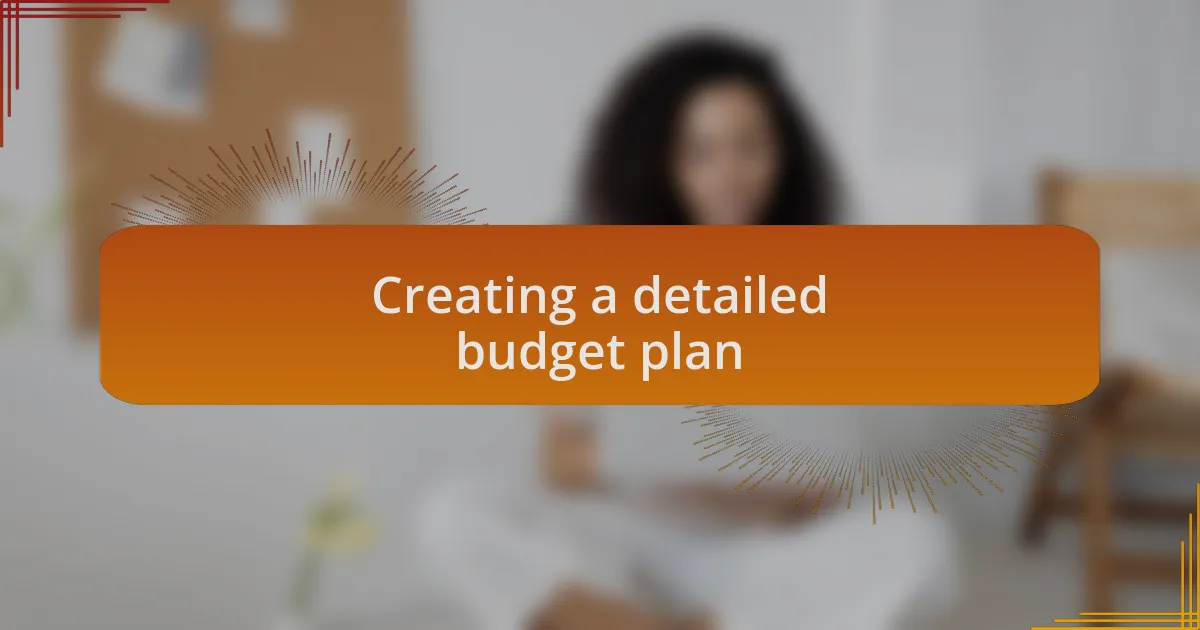Key takeaways:
- Fundraising events foster community and engagement, transforming simple donations into meaningful experiences.
- Accurate budgeting and clear financial goals are essential for successful fundraising events, ensuring transparency and accountability.
- Involving the team in budgeting and tracking expenses in real-time can prevent overspending and identify necessary adjustments.
- Adjusting budgets based on past experiences and feedback can enhance future fundraising efforts and optimize financial strategies.

Understanding fundraising events
Fundraising events are more than just opportunities to collect donations; they are gatherings that inspire, unite, and promote the mission of an organization. I remember attending a charity gala where the energy was palpable. The shared purpose among attendees fostered a sense of community that elevated the event beyond mere fundraising—it became a memorable experience.
Have you ever participated in a walk-a-thon or a bake sale? These grassroots events demonstrate the power of collective effort. They not only raise money but also create lasting connections between volunteers, donors, and beneficiaries. I felt this firsthand when my friends and I organized a local fun run. The camaraderie and excitement sparked conversations about the cause, turning simple participants into passionate advocates.
The beauty of fundraising events lies in their diversity. From elegant dinners to playful community fairs, each event can cater to different audiences and tastes. Reflecting on past experiences, I see how successful events often incorporated unique activities that engaged participants, making them feel invested in the outcome. Isn’t it fascinating how a well-planned event can transform a simple act of giving into a dynamic celebration of generosity?

Importance of budgeting
Budgeting serves as the backbone of any fundraising event, ensuring that every dollar is accounted for and effectively utilized. When I first started planning events, I underestimated how critical a detailed budget was. It wasn’t until I faced unexpected costs that jeopardized our goals that I realized a sound budget could be the difference between success and failure.
Understanding expenses helps not only in managing funds but also in setting realistic fundraising targets. I remember budgeting for a silent auction, where each item needed a precise valuation to attract suitable bids. By closely tracking potential expenses and anticipated income, I felt more confident approaching sponsors and donors, reducing stress and uncertainty.
Ultimately, budgeting fosters transparency and trust with stakeholders. I’ve learned that sharing budget outlines with our team and partners cultivated an environment where everyone felt invested. Doesn’t it make sense that when all involved understand the financial landscape, they’re more likely to support the event enthusiastically?

Setting clear financial goals
Setting clear financial goals is essential for any fundraising event. During my early days of event planning, I learned the hard way that vague financial targets can lead to disappointment. I had a charity gala where I ambiguously stated a goal of “raising money for our cause.” However, without a specific target, we ended up falling short of what we needed to cover costs and make a real impact.
I found that quantifying my goals not only sharpened my focus but also gave everyone involved a clear vision of what we were striving for. For instance, setting an ambitious but achievable target helped our entire team rally around a common purpose. I vividly recall the excitement in the room when we announced, “Our goal is to raise $20,000 for community programs.” There was a palpable energy as everyone understood exactly what was at stake.
When establishing these goals, it’s important to reflect on your organization’s needs. I always consider what funds are crucial for operational success and program implementation. By articulating these needs, I’ve found it easier to foster support from stakeholders. Do you want your sponsors to feel the urgency of your mission? Specific financial goals can create that emotional connection, helping them see the difference their contributions can make.

Estimating event costs accurately
When it comes to estimating event costs accurately, I’ve always found that breaking down expenses into detailed categories is invaluable. For example, during a recent fundraising dinner, I created a spreadsheet that itemized everything from venue rental and catering to marketing materials and entertainment. This meticulous approach not only helped me identify potential overspending but also provided a clear picture of what we truly needed to raise.
It’s easy to overlook small costs, but they can quickly add up and threaten your budget. I remember organizing a small art auction where I underestimated the cost of decorations and transportation for the artwork. By the time the event rolled around, these forgotten expenses exceeded my initial estimates, putting us in a tight spot. Have you ever considered how missing even minor details can derail your plans? I learned that it’s crucial to not only list the obvious expenses but also anticipate those hidden costs that might come back to bite you.
Involving your team in the budgeting process can lead to more accurate estimates as well. I often call upon colleagues who have previous experience in similar events, asking them about their insights on budgeting pitfalls they encountered. Sharing responsibility for budget estimates fosters a sense of ownership and accountability in the planning process. Plus, who knows? You might discover a valuable tip that transforms your cost-efficiency!

Creating a detailed budget plan
Creating a detailed budget plan can feel overwhelming, yet it’s a powerful tool that guides your fundraising event. I learned this firsthand while planning a community festival, where I crafted a comprehensive budget that listed every detail, including permits and insurance. The clarity it brought transformed what could have been a chaotic process into a structured roadmap, revealing not just costs but priorities.
One of the biggest lessons I’ve encountered is to factor in contingencies. For instance, during a fundraising gala, I set aside a portion of our budget for unexpected expenses. This cushion saved us when a last-minute venue change occurred; instead of panicking, we smoothly adjusted because we had planned for the unexpected. Have you ever faced surprise costs that derailed your plans? Trust me, building in a buffer is invaluable.
Lastly, I always recommend regularly revisiting the budget as planning progresses. When I coordinated a charity run, I revisited our budget weekly, allowing me to track spending and reallocate funds when needed. This kind of flexibility not only maintains control over finances but also adapts to dynamic situations we often encounter during event execution. Ultimately, a detailed budget plan is not just a static document; it’s a living guide that keeps your event on the right financial track.
![]()
Tracking expenses during events
Staying vigilant about expenses during an event is crucial for maintaining your budget. I remember a fundraising dinner where I assigned a team member the task of tracking every receipt. This decision paid off when we realized we had over-ordered food. Catching that error in real-time kept us under budget and allowed us to redirect funds toward a more impactful part of the event—like enhancing our guest speakers.
Using digital tools to track expenses can streamline this process significantly. During our last community outreach event, I employed an expense tracking app on my phone. It allowed me to log costs instantly, eliminating the hassle of sifting through dozens of paper receipts later. This approach not only saved time but also kept me connected to the budget as it evolved. You might consider whether tech could work for you, too—could it simplify your tracking process?
I’ve found incorporating a designated ‘spot-check’ for expenses incredibly beneficial. At a recent charity auction I managed, I scheduled brief intervals to review our spending against the budget. It was during one of these check-ins that I noticed we were exceeding our printing costs for promotional materials. By addressing it on the spot, we adjusted our strategy, which ultimately preserved our overall financial health. Have you ever overlooked something small that became a larger issue? This technique can help prevent those small oversights from snowballing into bigger financial dilemmas down the line.

Adjusting budget for future fundraising
Adjusting a budget for future fundraising isn’t just about numbers; it’s about learning from past experiences. I recall one event where we exceeded our allocated budget for marketing. In the aftermath, I sat down with my team to analyze where we went wrong, realizing we had relied too heavily on a single channel. By diversifying our outreach strategies for future events, we not only better managed our budget but also expanded our audience. Have you reflected on what led to financial overruns in your events?
Flexibility is key when adjusting budgets. I remember a scenario where unexpected expenses cropped up just days before a major fundraising gala. Instead of panicking, I called an emergency meeting to brainstorm solutions. We prioritized essential expenses and cut back on non-critical items, like fancy table decorations. This experience taught me that a budget should be a living document, reflecting the realities of each event. What’s your approach when you face the unexpected?
Incorporating feedback after each event can also reshape future fundraising budgets. I’ve made it a practice to collect insights from team members and attendees post-event. One year, feedback revealed that our catering costs were too high compared to the value perceived by guests. Taking this to heart, we strategized differently for the next event and focused on more cost-effective catering options, which enhanced both experience and budget efficiency. How often do you seek feedback, and how has it influenced your budgeting decisions?